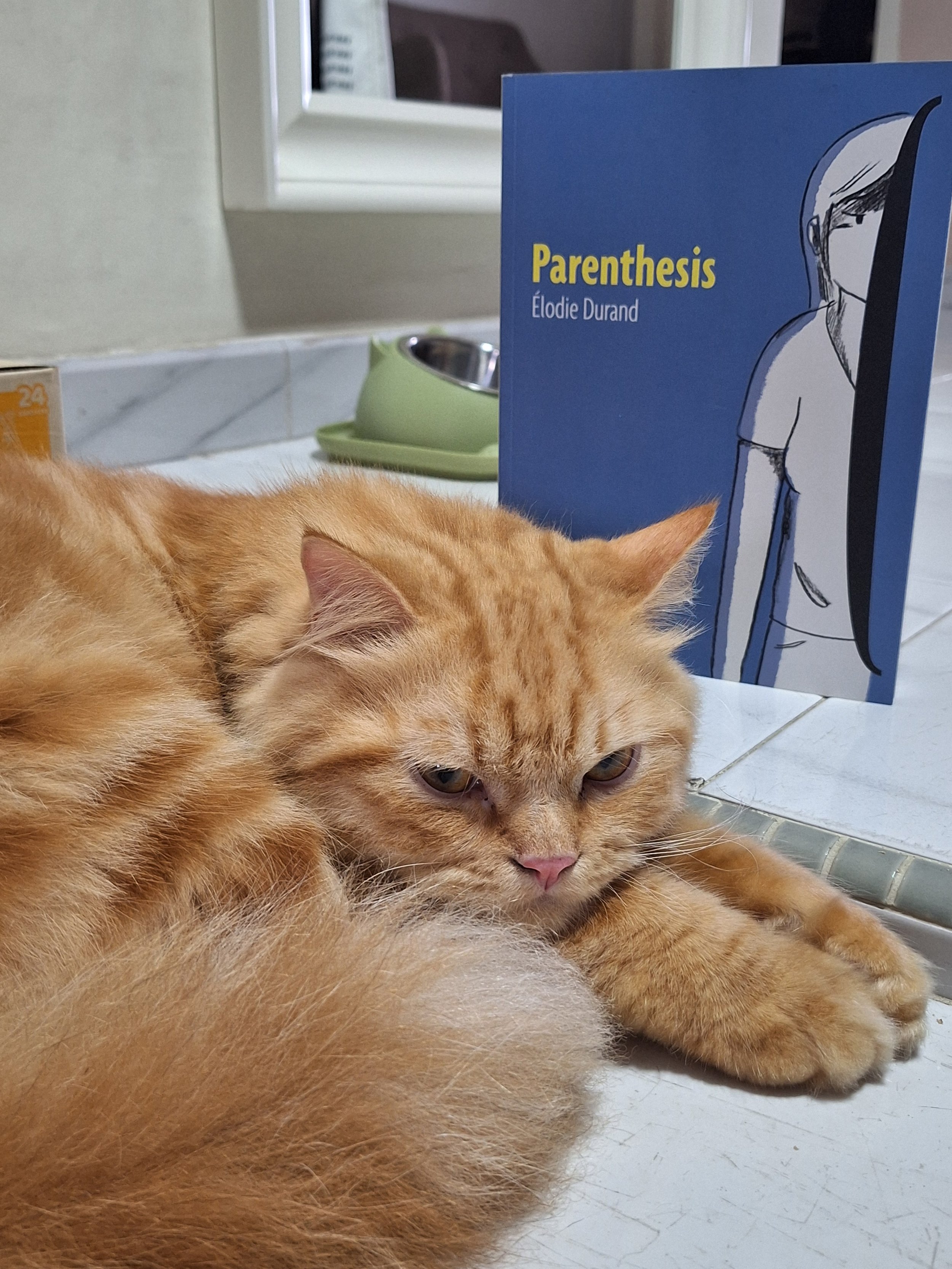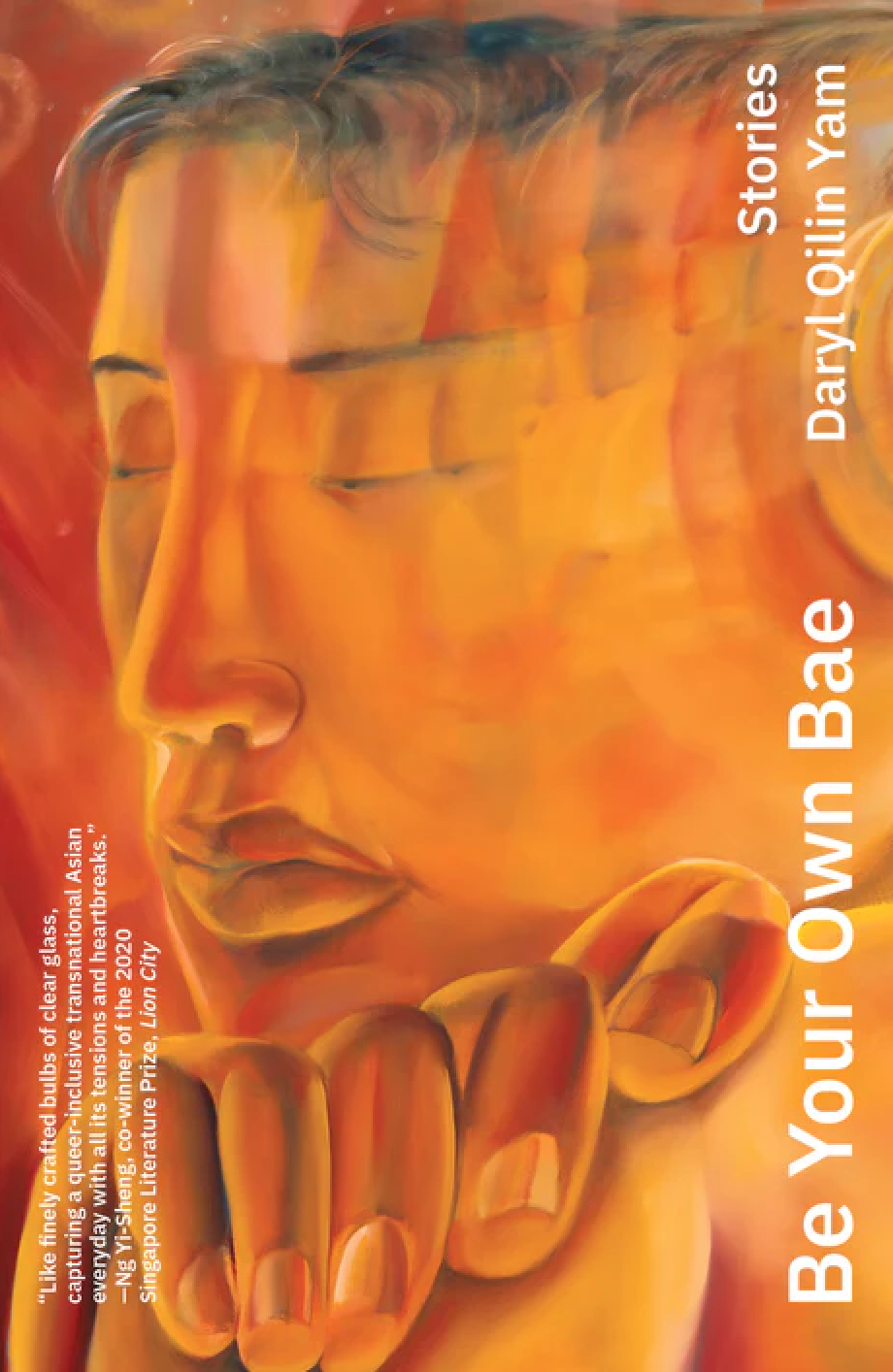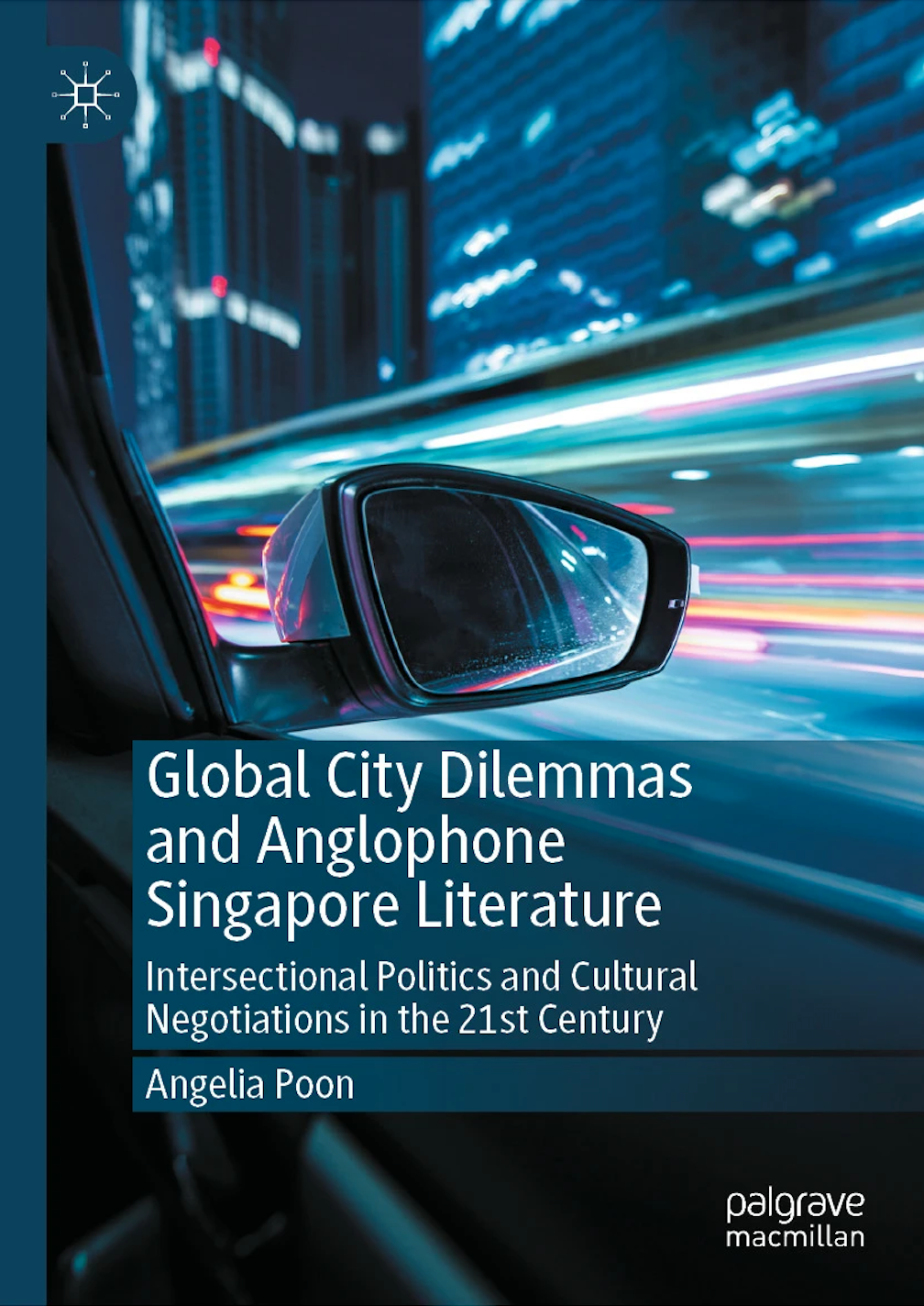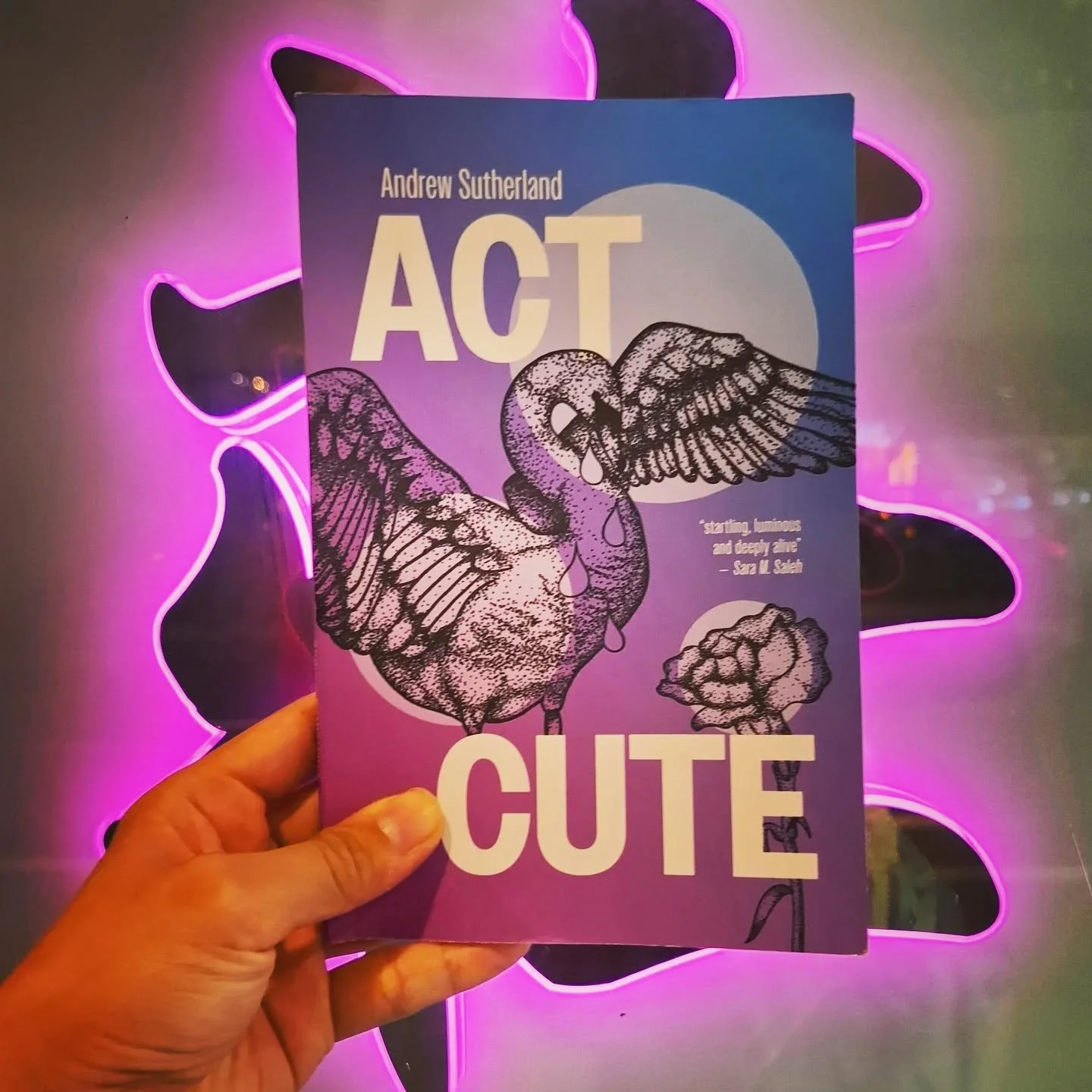Getting Under the Skin
By Aileen Liang
Review of Yoon Choi’s Skinship (US: Vintage Books, 2022)
Hyunsun Yoo - Untitled (2018), Oil on canvas, 50 cm x 59 cm
Image description: A painting, rendered mostly in dark tones and soft brushstrokes, depicts two abstract figures on a swing-set. The two-swing swing-set is made of red, yellow, and blue poles. The figure on the left swing is rendered entirely in bright-yellow; they swing high in the air, raising their legs above their body. The figure on the right swing is rendered entirely in shades of orange. They sit on a swing resting perpendicular to the ground. Their hands hold onto the swing’s ropes and their legs are stretched out in front of them. The background of the painting is rendered in cool tones and subtle brushstrokes, giving it a hazy, dreamlike quality. Two trees with dark-green, bare branches seem to blend into the background. The bottom half of the painting is made entirely of sweeping, dark-blue brushstrokes with spots of bright colors.
‘Skinship’: an unspoken intimacy or affinity, skin-deep at its barest but often backed by a sinewy tangle of other tensions. In contemplating the Korean-American experience, Choi plunges her debut collection of short stories, Skinship, right into the heart of the multigenerational Korean-American home. Within this space, fissures emerge: between couples, mothers and daughters, grandparents and grandchildren, strangers of the same skin, as frustrations incubated by first-generation Korean Americans are passed down to their descendants. In each of the stories, Choi pushes back against the one-dimensional notion of a happy family unit by drawing out the conflicted inner worlds of the individuals that populate it.
Choi has worked a multitude of perspectives into her short stories, with an honorary weight attributed to the voices of first-generation Korean Americans. The first story in the collection is ‘The Church of Abundant Life’, where a couple has spent the bulk of their marriage tending to a general store in a not-so-idyllic part of Pennsylvania. Choi is quick to remove any trace of romance from their reality; Soo-ah’s American Dream immediately materialises as a “sagging green awning [that read]: CANDY. SODA. FOOD. TOBACCO. EBT. ATM.” She will go on to make inventory lists, worry about her husband’s dinner, and live stoutly within her husband’s reminder that “This is life. This. Is. Life. This very thing is what life is.” Yet, when an encounter with an old friend-turned-pastor revives past memories, Soo-ah contemplates the weight of their sacrifices:
If only one of them had chosen otherwise, how different life would have been for all. There would have been hardships, but different hardships. Losses, but different losses. Losses that will forever rest unknown, without gaining nuance, or being turned inside out to reveal their very bones.
Soo-ah may have given in to despondency over her lack of choice, but Choi does not yield to a hazy nostalgia. She turns a keen eye on the meticulous process of homebuilding, like in ‘The Art of Losing’, where an older Han Mo-sae observes his wife’s touch in their home — “some unfinished work beside a sewing basket […] Matching armchairs angled as if in conversation. […] A bowl of fancy dusty candies.” The pleasant homeliness of the space is made possible by the deliberation of its arrangement by Young-ja’s cautious hands. Even flashbacks to the couple’s early days in America take on a grittiness when Mo-sae recalls seeing the “perimeters of [Young-ja’s] life: the toothbrush in a cup that she brought to the communal bathroom, the single hotplate, the twin mattresses on the floor”. The hardship Young-ja has endured expresses itself through the claustrophobia that permeates the scene, where an undeniable physicality is ascribed to Young-ja’s life. Choi makes explicit the trials they have faced, so that Young-ja’s tenacity is even more remarkable — “She knew that she would get up every morning and muscle through, as she always had.”
Hyunsun Yoo - Untitled (2020), Oil on canvas, 40 cm x 50 cm
Image description: A painting rendered in cool tones depicts two abstract figures playing a game of badminton. On the right, there is a building with doorways and windows. One figure stands on the left foreground of the painting, holding out their badminton racket. They are captured in mid-action with one leg in front of the other and their hair flowing out behind them. The other figure stands diagonally across from them, under a doorway of the building. They hold out their badminton racket; a badminton ball is just above it. The figures are rendered in the same color palette as the background. On the left background, there are tall, grass-like structures. On the top of the painting, white, bare branches hang downwards. Reflections on the ground are painted in sweeping, vertical brushstrokes, giving the ground a slippery, mirror-like quality.
Choi gives the pioneering generation the respect they have earned but also bluntly demonstrates the cost of their sacrifices — especially on the generation they end up raising. The title story, ‘Skinship’, poignantly depicts the silences of a family who has migrated to America to escape an abusive patriarch. Choi does not explicitly illustrate the scenes of domestic abuse, but the mother of the family literally embodies her survival instincts, as she moves with “[a] kind of deadpan expertise. A lack of expectations. Fold and stack, fold and stack.” The understatement of the abuse translates into a silence that the children, primarily So-hyun, must attempt to rationalise: “I think that absolution is probably a very common thing. That it must happen all the time in families.” As an impressionable So-hyun tries to rationalise this abuse, she develops a mode of survival, “a swift corrective applied to anything that resembled fondness or forgiveness.” Sacrifice, as Choi depicts it, may come from noble intentions, but it can also manifest problematically: it is the following generation that internalises the trauma and carries it on.
The second generation of Korean Americans in Choi’s stories possesses an ambition that Choi problematises with a ruthlessness bordering on cruelty. ‘A Map of the Simplified World’ follows Ji-won’s experiences growing up in Queens, where she befriends, then loses contact with, an Indian-American girl named Anjali. While the narrative includes episodes of innocent girlhood, the metaphorical employment of a lice outbreak highlights the competition rife in immigrant communities — including between two friends with immigrant parents. When Ji-won closes ranks with other children in targeting Anjali, she does so because she has rationalised to herself that “someone’s gain [is] at someone’s loss. But so what? That’s just how it was.” Ji-won may have worked her way to college by adopting a pragmatic worldview, but she has also lost her compassion to “the weight of responsibility toward [her family’s] striving”. Choi renders a more extreme image of ruthless entitlement in the character of Albert Uhm, who in ‘Solo Works for Piano’ maintains only a self-serving existence. While training for a prestigious piano competition, Albert is absolved of all duty to his family — “There was no expectation that Albert should mow the grass. There had never been that expectation.” Removed from the family unit altogether, Albert is a lone wolf; human contact has become so unnatural for him that he has to ask, “Can he really find in himself an accommodation like that?” The story could have probed its premise more acutely. A deeper examination of Albert’s motivations and familial relations would have made his narrative more compelling, although his nonchalant proclamations may be proof enough of a descendant numbed by the necessity of success.
If a sense of duty has hardened the younger generation, what can rehabilitate them to love? In ‘First Language’, Sae-ri looks at her son suspended from school and sees her negligence, to which she responds in two different ways: firstly with a punishing fist “[twisted] into the side of his head” and secondly with a series of affectionate names she calls him in Korean. Both responses are communicated in a non-English way — a physical, visceral action alongside the native tongue. Choi’s choice to leave the names untranslated creates a ‘metonymic gap’, a term coined by postcolonial theorist Bill Ashcroft in his book, Key Concepts in Post-colonial Studies. To borrow Ashcroft’s term, Choi’s insertion of Korean in an English text “constructs a ‘gap’ between the writer’s culture and the colonial culture”. This space, accessible only by Korean-speaking readers, temporarily shelters Min-woo from the burden of assimilation into an American world. He is understood and loved within the protections of an intimacy that has no English translation.
Hyunsun Yoo - Untitled (2019), Oil on canvas, 75 cm x 85 cm
Image description: A painting rendered in soft, hazy brushstrokes depicts two figures eating with chopsticks. The first figure takes up the entire left foreground of the image; they face the right. Painted abstractly in shades of green, blue, purple, and gray, the figure puts a pair of green chopsticks into their mouth. The subtle brushstrokes and surreal colors give them a translucent quality. The figure squats next to a metal grill, on which are various foods, including a slice of bacon. Above the metal grill, a second figure is depicted with a pink face; two spots of light blue represent their eyes. Their left hand, painted in yellow, holds a pair of red chopsticks that is raising food towards their mouth. Their other hand carries a plate that holds other food items. The figure seems to wear a thick scarf. Both figures are painted in outlines, without distinctive facial features. The background is rendered in the same colors as the figures.
Yet Choi resists the idealistic view of immediate intergenerational healing and gestures towards reconciliation instead. In ‘Song and Song’, Minyoung finds herself at the choke point of generations, held up against her mother who has made sacrifices for her, her sister who has chosen differently, and her daughter she is, herself, making sacrifices for. Contemplating her sister, Minji, who lives outside of the mould, Minyoung asks, “What is this life that she’s living? […] What about marriage? Having a family?” Being both a mother and university graduate, Minyoung has assigned herself the role of the successful daughter; naturally, her daughter, Charis, is expected to follow suit. It is individuality that Minyoung actively guards Charis from, “[a]ll those slashes and question marks”, all while experiencing her own insuppressible individuality as “something snarky and separate, some deeply submerged loyalty to self”. For Minyoung to make sense of these tensions, she concludes, “there is no point in seeking out contradictions. […] No point in having an accurate perception of another’s flaws. They simply have to be taken all in all.” Deeply ambivalent, Minyoung does not quite fall back on noble ideas of love and forgiveness, but simply on a state of acceptance. The family will just have to live with each other, in the same house, among and with the tensions they have carried for generations.
The predominant emotion that Choi’s Skinship evokes is unease — an unease just adjacent to affection. The Korean-American individual finds themselves mapped onto a kinship network, through which desires are passed down, misplaced, and only very rarely reconfigured. Moulded by the sacrifices of their predecessors, the individual must locate their identity within a larger sense of community: family first, then nation. Yet Choi is careful to debunk the notion of community being naturally harmonious and unified. She pries the Korean-American community wide open to reveal the cloying claustrophobia of living in each other’s dreams and desires. Love, familial and romantic, may at times be the salve, but resentment may just as easily alienate one person from another. Unity is hard-won yet necessary for survival; individuality may hinder economic and social progress. Choi negotiates a coexistence between the two in a precarious balancing act doubly weighted down by past woes and new hopes.
Hyunsun Yoo - Untitled (2020), Oil on canvas, 140 cm x 80 cm
Image description: The colorful painting depicts three human figures, rendered in subtle brushstrokes that give them a surreal, dreamlike quality. Each carries a puppy in their arms. In the foreground, two women take up either side of the painting; they face each other. The woman on the left, rendered in shades of green, looks down at the light-pink puppy she holds. The woman opposite her, rendered in blue and purple and wearing a beanie, reaches out to touch the light-pink puppy. In her own arms, she holds a white puppy with bright-green ears. In the background, a third woman watches them; she has blue hair and is holding a light-brown puppy. The colors of these women are echoed in the background, where shades of blue, green, red, and yellow rendered in thin brushstrokes resemble tall grass. Branches are painted on the women in the foreground, as if their bodies are translucent.
A lover of words and the worlds spun out of them, Aileen Liang is in her final year of undergraduate studies in English Literature at Nanyang Technological University, with inclinations to women’s writing and Southeast Asian literatures. When she is not reading, she is writing frantically in various notebooks and documenting life as best as she can.
*
Hyunsun yoo(1981)was born in Seoul, South Korea in 1981. She completed a bachelor of visual art, Painting as a major and Art history as a minor at Duksung Woman University in Seoul. After that started to study Fine art/painting at Applied art University in Vienna, Austria from 2013 with Professor Emma Rendl denk and finished study at 2022. Now she lives and works in Vienna and has exhibited in various countries/ Korea, Austria and many European countries.
If you’ve enjoyed reading this article, please consider making a donation. Your donation goes towards paying our contributors and a modest stipend to our editors. Singapore Unbound is powered by volunteers, and we depend on individual supporters. To maintain our independence, we do not seek or accept direct funding from any government.













In Taiwan Travelogue, ‘twinned souls… are at once lost, but also found, in translation.’ A review by Eunice Lim.